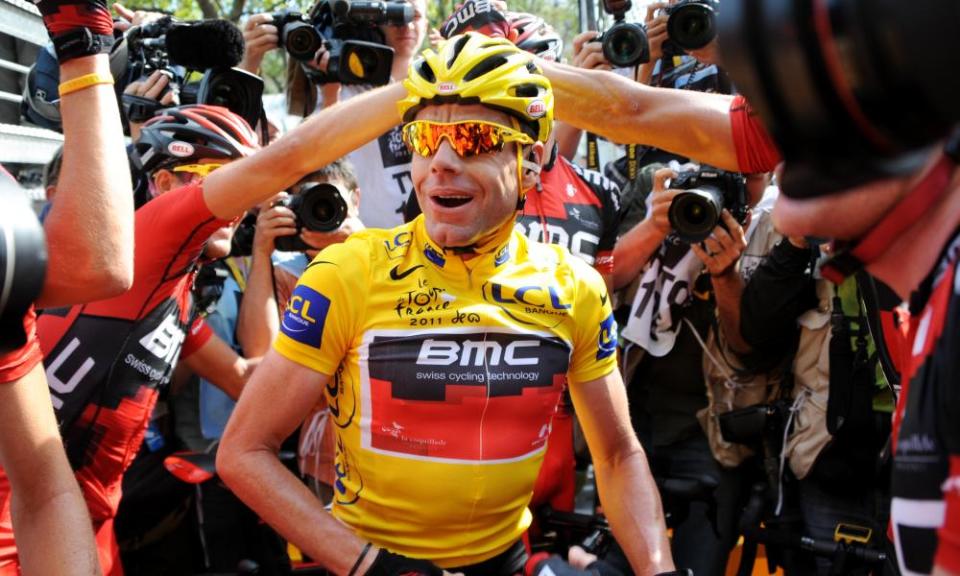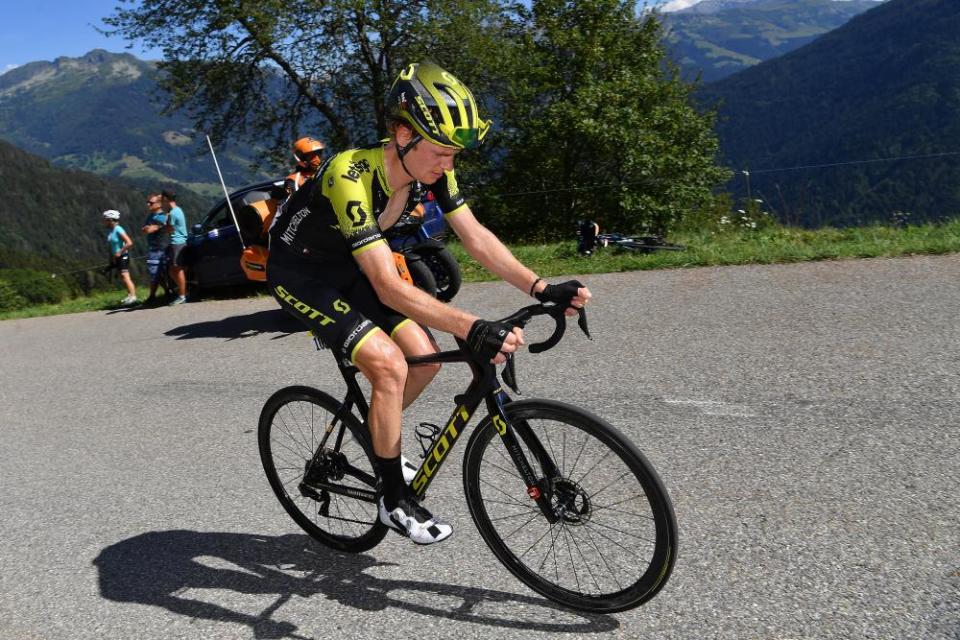'A lull between waves': Where is Australia’s next Cadel Evans?

In December 1913, two Australians departed Melbourne on a boat destined for Toulon, France, with ambitions to race in Europe’s biggest bike race. Ever since Don Kirkham and Iddo “Snowy” Munro contested the 1914 edition of the Tour de France, Australian cycling has had an enduring association with the race. Cadel Evans became the first Australian to win the Tour in 2011, while three Australians have won the green sprinters’ jersey.
But when the 2020 edition began on 29 August, just two Australians were at the start-line. The squad of Australian-registered team Mitchelton-Scott did not include a single domestic rider. After two decades of abundant Australians at the Tour, peaking with 12 in 2012, only Richie Porte and Caleb Ewan are flying the Australian flag this year. That is the least representation since 2001.
Related: Richie Porte sitting comfortably in absence of usual Tour de France noise | Sophie Smith
“I think it is partly just the unusual nature of this year,” says former national champion John Trevorrow, who has covered more than 20 editions of the Tour and is a close confidante of Mitchelton-Scott owner Gerry Ryan. “Teams don’t pick riders based on passports. Cycling has become so international.”
Covid has condensed the rescheduled World Tour calendar, with dozens of races being held in close succession. That means Australian riders who might otherwise have ridden the Tour are targeting other races. “I think it is indicative of the Covid-19 environment and the close proximity of the three Grand Tours,” says Donna Rae-Szalinski, endurance development coordinator with peak body Cycling Australia. “Teams are spreading their riders around. We have great numbers competing at that top level – they’re just being distributed differently.
Tom Petty, sports director with domestic Australian outfit Team BridgeLane, is adamant that the low numbers are no more than a coincidence. “We are certainly not running out of talent,” he says. “We have a huge pool of talent coming through – maybe this is a changing of the guard or a lull between waves.”
Among the next generation of riders, 27-year-old Jack Haig and 24-year-old Lucas Hamilton have long been touted as potential successors to Evans in challenging for the general classification at major races. Both ride for Mitchelton-Scott, although Haig is leaving at the end of this season in the hope of more opportunities at Bahrain McLaren. While each has performed admirably in a support capacity at big races, neither has yet secured a major result of their own.
“Jack and Lucas have both stepped up their level of climbing in the last year,” says Andrew Christie-Johnston, a veteran team manager in Australia’s National Road Series who helped develop some of the country’s best cyclists, including Porte. “ACJ”, as the manager is known, compares Hamilton to last year’s Tour de France winner, 23-year-old Colombian prodigy Egan Bernal.
“When Bernal won Tour de l’Avenir, Lucas was fourth – and not that far behind. While Bernal has gone on in leaps and bounds, Lucas has taken a bit longer – that doesn’t mean he can’t close the gap.”
But Trevorrow is unsure whether Haig or Hamilton could one day win the iconic yellow jersey. “To be a Tour de France contender, you have to be able to climb and time trial. Jack and Lucas are very good bike riders, but they are lacking in one area – neither is a great time trialler.”

Beyond the Mitchelton-Scott duo, there are a number of young riders with plenty of potential. Chris Harper, 25, joined powerhouse team Jumbo Visma this season and is likely to make his Grand Tour debut in October at the Giro d’Italia. “Chris is an extremely late starter in the sport, and will continue to improve,” says Christie-Johnston. The Tasmanian again draws comparisons with the reigning Tour de France champion. “Bernal won Le Tour de Savoie Mont Blanc [a notoriously hilly French race] in 2017 by a minute or so,” he says. “Last year Chris won it by six.”
Christie-Johnston also cites Jai Hindley (24, Team Sunweb), Michael Storer (23, Team Sunweb) and Ben O’Connor (24, NTT Pro Cycling), while Petty adds Dylan Sunderland (24, NTT Pro Cycling), Robert Stannard (21, Mitchelton-Scott) and Sebastian Berwick (20, Israel Start-Up Nation). “Out of that entire group, we’ll get someone who competes at the highest level,” says Christie-Johnston. “The talent is there – we just have to be patient. We will get to our boom years soon enough.”
Another potential source of new talent is a different cycling discipline: track. Australia’s endurance team won the men’s team pursuit at the 2019 world championships, and earned silver at the Rio 2016 Olympics. After Tokyo, a number of riders may switch to the road – where they are well-placed to thrive. “That’s the biggest unknown,” says Petty. “If they decide to go across, the likes of Kell O’Brien, Sam Welsford, Cam Scott, Luke Plapp have shown on the track the talent they have. That will be really exciting.”
The other unknown is the impact of Covid. While most other domestic sports have restarted, the National Road Series – which draws riders from across Australia – is still dormant due to border restrictions.
Related: Mitchelton-Scott’s Gerry Ryan: ‘I hope our riders remain safe’ | Kieran Pender
“The NRS is a pivotal step,” says Petty, whose team won the series in 2019. “Without proving yourself in the NRS, you don’t get picked up by a World Tour team.” Petty worries that younger riders might leave the sport due to an absence of opportunities. “It is very challenging for the junior talent,” he says. “If you are 18, your parents are seeing the pandemic and saying ‘we’re not sure when you will be able to race again, maybe get a job instead’ – that adds a lot of pressure. Hopefully the next Cadel Evans does make it through. You never want young kids to lose their chance.”
Despite these obstacles, Rae-Szalinski, who runs an extensive talent development program for Cycling Australia, remains upbeat. “We have a really good system developing riders to that level,” she says. “It takes a very special person to win a Grand Tour, but I think we are putting good numbers into the World Tour. From there, anything is possible.”
Trevorrow is somewhat less sanguine. “Everyone wants to see the next Cadel,” he says. “It is not a lack of talent – we have plenty of talent coming out of Australia. But genuine general classification talent is few and far between. We have only won one Tour de France. There just aren’t that many riders anywhere in the world who can do that.”

 Yahoo Sport
Yahoo Sport 





































